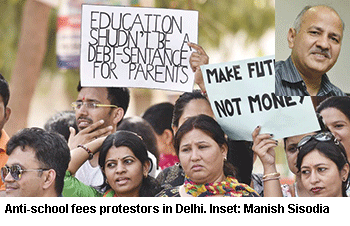 Despite several decisive victories for autonomy — T.M.A. Pai vs. Union of India (2002) and Inamdar’s Case (2005) — in the Supreme Court, private independent education institutions are experiencing incremental pressure from the Central and state governments — and a subsidies-addicted middle class — for government ‘regulation’ (reduction) of their tuition fees. This time round, the pressure is for regulation of the fees of private unaided (i.e, independent) K-12 schools.
Despite several decisive victories for autonomy — T.M.A. Pai vs. Union of India (2002) and Inamdar’s Case (2005) — in the Supreme Court, private independent education institutions are experiencing incremental pressure from the Central and state governments — and a subsidies-addicted middle class — for government ‘regulation’ (reduction) of their tuition fees. This time round, the pressure is for regulation of the fees of private unaided (i.e, independent) K-12 schools.
Given the power and influence of the country’s 200 million strong middle class — despite new millennium Supreme Court liberal judgements freeing private education institutions from government shackles — the regulation of fees levied by private independent schools has become a hot potato political issue with state governments countrywide imposing tuition fees regulation mechanisms.
In a milestone verdict on December 27, the Gujarat high court affirmed the constitutional validity of the Gujarat Self-Financed Schools (Regulation of Fees) Act, 2017 which imposes annual tuition fee ceilings on primary (Rs.15,000), secondary (Rs.25,000) and higher secondary (Rs.27,000) schools statewide, regardless of exam board affiliation.
In Delhi, a state government directorate of education’s circular of October 17 permitting schools to hike tuition fees to meet the obligations of paying teachers arrears and enhanced salaries awarded by the Seventh Pay Commission, has stirred a hornet’s nest. It permitted a fee increase of 7.5 percent retrospectively from January 1, 2016 to June 2017 and 15 percent thereafter.
On the basis of the state government’s circular, several schools in the national capital sent demand letters to parents. This mid-term demand and quantum decreed has angered many parents who protested and according to the Delhi government, it received numerous complaints against schools. The issue took a curious turn when through activist-advocate Khagesh Jha, 88 children of ASN Public School, Mayur Vihar, challenged the fee hike notification and sought its quashing on the ground that it was an ad-hoc decision and was passed without examining the accounts of schools.
On December 21, while hearing this petition, the Delhi high court stayed the government’s notification allowing the fee hike to private unaided schools. A bench of Justices Siddharth Mridul and Deepa Sharma granted an interim stay after the AAP government undertook to keep the fee hike notification of October 17, 2017 in abeyance.
In a tweet hailing the high court’s stay order, Manish Sisodia, the education minister who is also the powerful deputy chief minister of the government of Delhi state, wrote, “I assure parents we will protect their interests. The government is committed to fighting financial malpractices in private schools, and haven’t let fees be hiked for two years. We will not let private schools hike their fees illegitimately in the future too.” An audit has been ordered of the schools that have already increased fees as per the state government’s circular.
Armed with the court order, the AAP government has demanded the financial statements of all 1,700 private schools in Delhi state for the past three years for audit by a panel of chartered accountants. The report of the chartered accountants will then be examined by officials from the state government’s directorate of education (DoE).
Private schools at the receiving end say the government is trying to delay the hike in school fees to meet the additional expenditure incurred because of the Seventh Pay Commission award. “Why didn’t the state government order an audit a year ago when the Seventh Pay Commission award was made? Now the audit will take at least three months. Meanwhile, we will have to continue paying teachers Seventh Pay Commission salaries. If right now, parents are stressed about the payment of additional fees including arrears, what will happen a year later if DoE finds that our schools are in the red?” asks S.K. Bhattacharya, president of the Action Committee of Private Unaided Recognised Schools.
Adds long-time school fees regulation activist and persistent litigant Ashok Aggarwal, who is also the president of the India Parents’ Association: “The fee-hike problem isn’t going to get resolved unless we have a national law permitting regulation of fees of independent schools. Moreover, parents should be given 50 percent representation in school management committees (established under s.28 of the RTE Act). This will enable internal regulation of schools’ tuition fee increases. This is the only long-term solution.”
This suggestion which will in effect enable parents and school managements to negotiate fee increases bilaterally, is worthy of consideration. Because right now, school managements are more focused on litigation than on the education of children.
Autar Nehru (Delhi)























